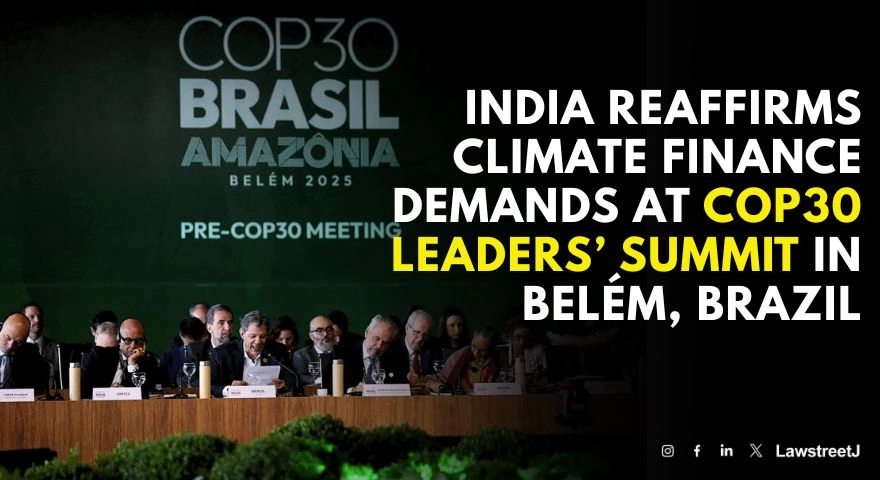New Delhi: India has opened its participation at the COP30 Leaders’ Summit in Belém by calling for stronger climate finance commitments from developed nations. The country’s ambassador to Brazil represented India during the high-level segment on November 6–7, while Union Environment Minister Bhupender Yadav will join later to lead the delegation during the second week of the conference. Hosted by Brazilian President Luiz Inácio Lula da Silva and UN Secretary-General António Guterres, the summit marks a decade since the signing of the Paris Agreement, bringing renewed attention to global climate finance and adaptation goals.
India’s Representation and Strategic Timing
New Delhi’s decision to have its envoy attend the opening sessions reflects a deliberate diplomatic approach. Although Prime Minister Narendra Modi is not attending, Indian officials remain active in shaping the summit’s direction. The Leaders’ Summit—attended by over 140 delegations, including 57 heads of state and 39 ministers—is intended to set the political agenda for COP30, which runs from November 10 to 21. Minister Yadav’s later arrival follows a pattern seen at COP29 in Baku, where India maintained a reserved presence during the initial stages. At that conference, India had opposed a proposed $300 billion global climate finance target, arguing that it was insufficient.
In Belém, India is expected to reiterate that developed countries must restore trust by meeting earlier pledges and providing grant-based, predictable, and transparent funding, particularly for adaptation and loss-and-damage projects.
India’s Climate Finance Position
India’s climate finance stance is firmly grounded in the United Nations Framework Convention on Climate Change (UNFCCC) and the Paris Agreement. Article 9 of the Paris Agreement obliges developed nations to provide financial resources to help developing countries undertake mitigation and adaptation measures.
India has repeatedly called for non-debt-creating, grant-based finance to support adaptation, emphasizing that vulnerable populations bear the greatest burden of climate impacts. Minister Yadav has also underscored the need to finalize adaptation indicators under Article 7.1, which focuses on building resilience and reducing vulnerability to climate change. India insists that these indicators should reflect national circumstances, financial capacity, and technological readiness, rather than follow a one-size-fits-all global approach.
At COP30, India is also advocating progress on the Just Transition Work Programme (JTWP)—a framework designed to help developing economies shift to low-carbon pathways in an equitable manner. In its formal submissions to the UNFCCC, India has called for clarity and accountability in tracking and reporting climate finance flows. It continues to remind developed countries of the $100 billion annual commitment made at the 2009 Copenhagen Summit—a target that remains unmet.
Key Themes: Forests, Adaptation, and Renewable Energy
The discussions at COP30 focus on forests, renewable energy, food security, and finance. India is contributing to talks on forest preservation through the REDD+ mechanism (Reducing Emissions from Deforestation and Forest Degradation), which rewards sustainable forest management and conservation with financial support.
In the renewable sector, India plans to highlight the work of the International Solar Alliance (ISA) and its national goal of achieving 500 GW of non-fossil fuel capacity by 2030. This target forms part of India’s updated Nationally Determined Contributions (NDCs) and its Long-Term Low-Emission Development Strategy (LT-LEDS) submitted to the UNFCCC in 2022.
Adaptation continues to be a central issue for India. The delegation is pressing for stable and sufficient funding to strengthen climate-resilient infrastructure, expand early warning systems, and support agricultural adaptation. India’s National Action Plan on Climate Change (NAPCC) and State Action Plans are expected to be referenced as examples of national frameworks aligned with international adaptation goals.
Equity, Accountability, and Legal Foundations
India’s negotiating position draws on the principles of equity and common but differentiated responsibilities and respective capabilities (CBDR-RC)—the foundation of both the UNFCCC and the Paris Agreement. These principles assign a larger share of responsibility to developed economies, recognizing the developmental needs of the Global South.
Officials have emphasized the need for transparent accounting of financial flows. India supports adopting a common reporting format under the Enhanced Transparency Framework (ETF) to verify contributions and ensure that climate finance is delivered as promised.
Conclusion
India’s role at COP30 combines diplomatic engagement with legal advocacy. By highlighting unmet financial promises and the need for predictable, grant-based support, India seeks to reinforce trust in the global climate system. As negotiations move into the second week, Environment Minister Bhupender Yadav is expected to lead India’s formal interventions on finance, adaptation, and technology transfer. The focus remains on securing fair access to resources and reaffirming the principles of equity and accountability embedded in international climate law.









